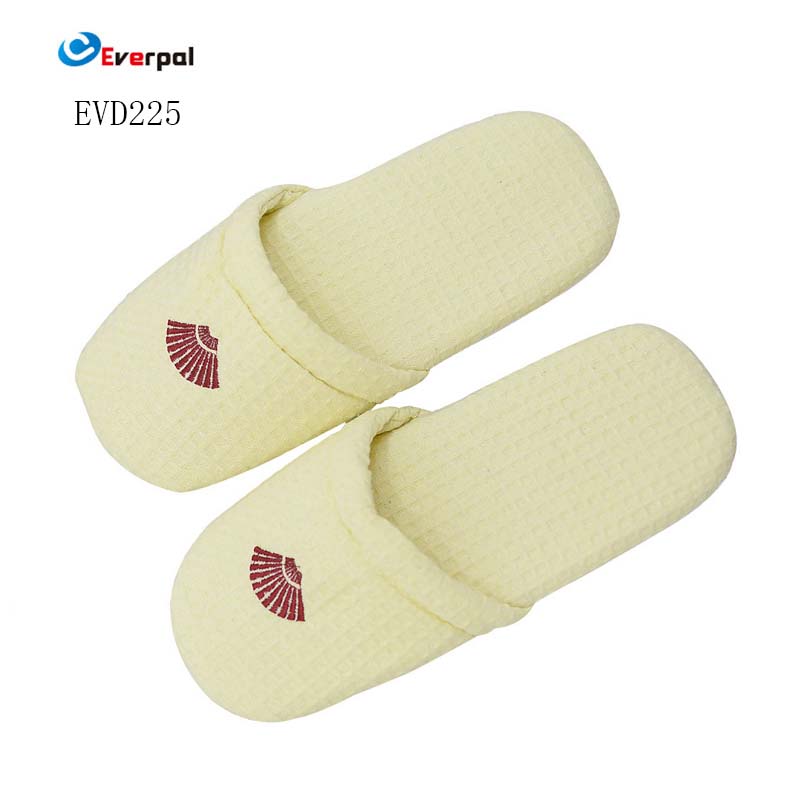Why Are Hotel Slippers Becoming the Next Big Trend in Hospitality Comfort?
2025-11-05
Hotel slippers are more than a small comfort — they represent the subtle intersection of hygiene, luxury, and guest experience. These lightweight, soft indoor shoes are commonly provided by hotels, resorts, and spas to enhance comfort and maintain cleanliness within rooms. Designed for one-time or limited use, hotel slippers help protect feet from cold floors while creating a sense of personal luxury that defines premium hospitality.
In today’s competitive hotel industry, details like high-quality slippers can strongly influence guest satisfaction and reviews. Travelers increasingly value comfort, sustainability, and thoughtful amenities. As a result, hotel slippers have evolved from a simple complimentary item into an expression of brand identity and service quality.
Product Overview and Key Specifications
| Feature | Description |
|---|---|
| Material Options | Terry cloth, cotton, non-woven fabric, EVA, or velvet |
| Sole Type | EVA, TPR, or foam soles for anti-slip protection |
| Sizes Available | Standard unisex sizes: 28–31 cm |
| Colors | White, beige, gray, black, or custom colors |
| Logo Customization | Embroidery, screen printing, or heat transfer |
| Packaging | Individual OPP bag, paper wrap, or eco-friendly alternatives |
| Usage | Suitable for hotels, resorts, spas, airlines, and guesthouses |
| Certifications | ISO 9001, SGS-tested materials, environmental compliance |
This professional combination of comfort, hygiene, and brand customization makes hotel slippers an integral part of the guest experience. Whether made from plush cotton for a five-star resort or simple non-woven fabric for business hotels, every detail contributes to how guests perceive quality.
Why Are Hotel Slippers So Important for Guest Experience and Brand Image?
1. Comfort Beyond the Bed
Guests often judge a stay by how relaxed they feel in every corner of their room. Slippers provide a home-like warmth, especially on tiled or marble floors. Their softness adds to the sensory comfort that helps travelers unwind after a long day.
2. Hygiene and Protection
Cleanliness has become one of the most decisive factors in hospitality. Slippers act as a hygienic barrier between feet and floor, preventing direct contact with surfaces that may not be fully sanitized. This is especially critical post-pandemic, where hotels are expected to maintain the highest hygiene standards.
3. Branding and Customization Opportunities
Slippers have evolved into branding tools. Hotels can incorporate their logo, colors, or even slogans, leaving a subtle but lasting impression. A guest who wears branded slippers during and after their stay becomes a walking ambassador of that hotel experience.
4. Sustainability and Eco-Friendly Choices
With increasing environmental awareness, the hospitality sector is shifting toward biodegradable, recyclable, and washable slippers. Materials like organic cotton, bamboo fiber, or recycled EVA allow hotels to meet green certification requirements while enhancing their corporate responsibility image.
5. Affordability and Bulk Efficiency
From a procurement perspective, hotel slippers are cost-effective. Mass production allows hotels to offer luxury-level comfort at low unit costs, with customization available even for mid-tier brands.
How Are Hotel Slippers Evolving With Technology and Future Trends?
The evolution of hotel slippers reflects broader hospitality trends — sustainability, innovation, and personalized experiences.
1. Smart Material Integration
New fabrics like anti-bacterial microfiber, odor-resistant materials, and water-repellent coatings are being developed. These enhance hygiene and extend product life, making them suitable even for multi-use in premium suites.
2. Eco-Friendly Manufacturing
Hotels are adopting slippers made from biodegradable materials such as bamboo fiber, organic cotton, or cornstarch-based EVA soles. Factories are increasingly implementing low-impact dyeing and zero-waste cutting processes to minimize environmental footprints.
3. Design Personalization
The future of hotel amenities lies in personalization. Many luxury hotels now use embroidered initials or regionally inspired designs that resonate with the property’s aesthetic identity. For instance, a beach resort might provide open-toe slippers with tropical prints, while a mountain retreat offers fleece-lined models.
4. Digital Supply Chain and Quality Control
With AI-driven production systems (for internal manufacturing management), manufacturers can maintain uniform quality, manage bulk orders efficiently, and ensure timely delivery to hotel partners worldwide. This precision ensures consistent guest satisfaction and reduces operational errors.
5. Growing Demand from Non-Hotel Sectors
Hotel slippers are now being used in home hospitality, wellness centers, beauty salons, and airlines. Their versatile design and hygienic benefits make them suitable across industries focused on comfort and cleanliness.
What Are the Common Questions About Hotel Slippers?
Q1: Are hotel slippers safe for reuse or multiple guests?
A1: Most hotel slippers are designed for one-time use to maintain hygiene standards. However, reusable versions made from washable materials like cotton or velvet are increasingly popular in eco-friendly hotels. These can be sanitized and reused after each guest, reducing waste while maintaining hygiene.
Q2: What is the best material for hotel slippers?
A2: The ideal material depends on the property type. Cotton terry or velour offers luxury softness for high-end hotels, while non-woven or EVA slippers provide practicality for budget accommodations. For eco-conscious hotels, bamboo fiber or recycled cotton offers the perfect blend of comfort and sustainability.
How to Choose the Right Hotel Slippers for Your Property
Selecting the right slippers requires balancing comfort, cost, durability, and brand aesthetics. Below are key decision factors for procurement managers:
-
Guest Profile – Business travelers may prefer closed-toe slippers for professional settings, while resort guests might favor open-toe designs for breathability.
-
Durability Requirements – For long-stay guests, choose thicker soles and high-density fabrics.
-
Brand Identity – Match slipper colors and embroidery with hotel interior tones or brand logo for visual consistency.
-
Budget Considerations – While non-woven slippers are affordable for mass use, EVA or TPR soles provide premium anti-slip protection suitable for luxury rooms.
-
Environmental Standards – Opt for eco-certified materials to align with sustainable business practices.
The Future Outlook of Hotel Slippers in the Global Market
The global demand for hotel slippers is expected to grow steadily due to rising travel frequency, expanding hospitality infrastructure, and consumer preference for comfort-driven experiences. North America and Europe lead in adopting sustainable slipper models, while Asia-Pacific dominates production and export.
As hotels strive to differentiate themselves, even the smallest details — such as the texture, feel, and design of a slipper — can influence guest loyalty and online reviews. The hospitality industry increasingly recognizes that comfort is not just a luxury but a competitive advantage.
Future innovations may include temperature-regulating slippers, memory foam padding, and smart fabrics capable of wicking moisture and eliminating odor. The combination of comfort, hygiene, and sustainability will continue to drive purchasing decisions across global hotel chains.
Conclusion: Why Quality Slippers Define Quality Stays
Hotel slippers represent more than comfort — they embody hospitality excellence, hygiene assurance, and brand sophistication. A pair of well-crafted slippers can transform a simple hotel room into a relaxing retreat, making guests feel valued and cared for.
As the hospitality industry embraces sustainability and customization, the importance of choosing the right slippers becomes even more significant. Whether for a boutique hotel, spa, or international resort, investing in high-quality slippers reflects a commitment to superior guest experience and responsible business practice.
Everpal, a trusted manufacturer specializing in premium hotel slippers, continues to innovate with eco-friendly materials, precise craftsmanship, and customized branding solutions for hotels worldwide.
For more information or to explore customized hotel slipper options, contact us and experience how Everpal can elevate your hospitality standards through comfort, quality, and design excellence.



